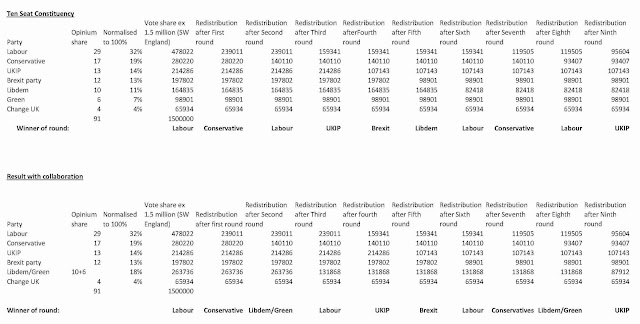Modelling Electoral Co-operation
Whilst more modelling has uncovered an error in my earlier spreadsheet, it confirms my conclusion that collaborating to achieve a larger share of the vote is worthwhile, often critical. It has also revealed four handy rules.
By way of background, European Parliament constituency sizes range from 3 seaters (North-East England and Northern Ireland) up to South East England with ten seats, something that matters more than I had realised.
First that mistake. In the example I gave, of a six seat constituency, the result would actually be the same regardless of whether or not collaboration takes place because the Libdems win the sixth seat - just in time. But this is not so if the constituency was smaller because the order in which you get to 'win' a seat matters. In a constituency with 5 or less seats, the Libdems on their own would have no seat. And with a seat of 9 or more seats, the LibDem/Green 'Alliance' would get two seats, whereas the Libdems on their own would only get one seat. The spreadsheet below shows this.

Now for those handy rules.
Rule 1 is that the larger the number of seats available, the fairer the treatment of all, especially parties with less large shares of the vote.
Rule 2 is that the threshold for getting seats at all varies - and gets tougher as the number of seats available in the constituency diminishes. In a three seat constituency you probably need to get more than half the leading party's vote share to get any seats: in a 10 seat constituency you will need far less than that.
Rule 3 seems to be that the party with the largest share gets a bonus - slightly more seats than their share of the vote suggests. This is effectively 'at the expense of' the smaller parties which, as Rule 2 explains, lose out completely if they do not reach a certain level of vote. In our simulation if you had 14% or less of the vote you got no seats in a three seat constituency.
Rule 4 is that the larger the share of the vote you have, the further you rise up the pecking order. If you have a larger share of the vote, you will get a seat sooner than if you have a smaller one - and you may get no seats at all. This is where collaboration pays its dividends because you can win even in smaller constituencies and gain an extra seat in larger ones.
So collaboration does matter. Whether the smaller parties will collaborate remains to be seen. It seems to be too late for a joint ticket. Those with a thorough understanding of election rules may see other ways to collaborate but if the smaller parties stick to their instinctive tribal behaviour, they will all lose seats that they could have won with collaboration.
Putney Politics
16 April 2019
By way of background, European Parliament constituency sizes range from 3 seaters (North-East England and Northern Ireland) up to South East England with ten seats, something that matters more than I had realised.
First that mistake. In the example I gave, of a six seat constituency, the result would actually be the same regardless of whether or not collaboration takes place because the Libdems win the sixth seat - just in time. But this is not so if the constituency was smaller because the order in which you get to 'win' a seat matters. In a constituency with 5 or less seats, the Libdems on their own would have no seat. And with a seat of 9 or more seats, the LibDem/Green 'Alliance' would get two seats, whereas the Libdems on their own would only get one seat. The spreadsheet below shows this.

Now for those handy rules.
Rule 1 is that the larger the number of seats available, the fairer the treatment of all, especially parties with less large shares of the vote.
Rule 2 is that the threshold for getting seats at all varies - and gets tougher as the number of seats available in the constituency diminishes. In a three seat constituency you probably need to get more than half the leading party's vote share to get any seats: in a 10 seat constituency you will need far less than that.
Rule 3 seems to be that the party with the largest share gets a bonus - slightly more seats than their share of the vote suggests. This is effectively 'at the expense of' the smaller parties which, as Rule 2 explains, lose out completely if they do not reach a certain level of vote. In our simulation if you had 14% or less of the vote you got no seats in a three seat constituency.
Rule 4 is that the larger the share of the vote you have, the further you rise up the pecking order. If you have a larger share of the vote, you will get a seat sooner than if you have a smaller one - and you may get no seats at all. This is where collaboration pays its dividends because you can win even in smaller constituencies and gain an extra seat in larger ones.
So collaboration does matter. Whether the smaller parties will collaborate remains to be seen. It seems to be too late for a joint ticket. Those with a thorough understanding of election rules may see other ways to collaborate but if the smaller parties stick to their instinctive tribal behaviour, they will all lose seats that they could have won with collaboration.
Putney Politics
16 April 2019

Comments
Post a Comment